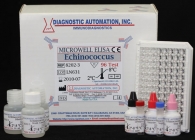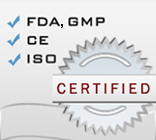
ELISA Kits
- • Anemia ELISA kits
- • Allergy ELISA kits
- • Autoimmune Disease kits
- • Bone Metabolism ELISA kits
- • Blood bank ELISA kits
- • Cancer ELISA kits
- • Cardiac Markers ELISA kits
- • Diabetes Assays ELISA kits
- • Drug test ELISA kits
- • Fertility ELISA kits
- • Food ELISA kits
- • Infectious Disease ELISA kits
- • Other ELISA Kits
- • Parasitology ELISA kits
- • Steroid ELISA kits
- • Thyroid ELISA kits
Rapid Tests
- • Allergy Rapid tests
- • Bone Metabolism
- • Cancer Rapid tests
- • Cardiac markers Rapid tests
- • Drug Tests
- • Fertility Rapid tests
- • Hepatitis Panel
- • Infectious Disease & other tests
- • Other
- • Ovulation Rapid tests
- • Pregnancy tests
- • Urine Reagent Strips tests
IFA Kits
Chemiluminescence Immuno Assays
- • Allergy Assays
- • Autoimmune Thyroid Assays
- • Cardio-Vascular Monitoring
- • Diabetes Assays
- • Fertility Assays
- • Growth Deficiency
- • Infectious Disease Assays
- • Others
- • Steroid Assays
- • Thyroid Assays
- • Tumor Marker Assays
Serology Tests
- • ASO (Anti-Streptolysin-O)
- • CRP (C-Reactive Protein)
- • Mono (Infectious Mononucleosis)
- • RF (Rheumatoid Factor)
- • RPR (Rapid Plasma Reagin)
- • SLE (Systemic Lupus Erythematosus)
Instrumentation



Echinococcus IgG ELISA kit
| Name |
Echinococcus IgG ELISA Test |
|---|---|
| Full name |
Human Echinococcus IgG ELISA Test Kit |
| Category Name | Parasitology ELISA kits |
| Test | 96 |
| Method | ELISA method: Enzyme Linked Immunosorbent Assay |
| Principle | Sandwich Complex |
| Detection Range | Qualitative elisa assay- Positive, Negative Controls |
| Sample | 5 ul serum |
| Specificity | 100% |
| Sensitivity | 100% |
| Total Time | ~20 min |
| Shelf Life | 12 Months from the manufacturing date |
 |
 |
 |
Echinococcus IgG ELISA kit description:
Echinococcus ELISA Test is an enzyme linked immunosorbent assay (ELISA) for the qualitative identification of IgG antibodies to Echinococcus in serum.
Material Provided with Echinococcus ELISA kit:
1. Test Strips Microwells: 96 test wells containing Echinococcus antigens
2. Enzyme Conjugate: Protein A conjugated to peroxidase
3. Positive Control: diluted diluted positive rabbit serum
4. Negative Control: diluted negative human serum
5. TMB Substrate Solution: TMB
6. Wash Concentrate 20X
7. Dilution Buffer
8. Stop Solution: 0.73 M phosphoric acid
Materials Required, Not Provided:
1. Precision pipettes
2. Distilled or deionized water
3. EIA kit Microplate Washer
4. EIA kit Microplate Reader with a 450 nm and a 620 - 650 nm filter
Echinococcus ELISA kit Background Information:
Echinococcosis (hydatidosis) is the infection caused by cestodes of the genus Echinococcus. Humans are potential intermediate hosts and can become infected by ingesting eggs passed in the feces of an infected animal. The resulting disease is called hydatidosis, or hydatid disease.
Four species are known pathogens of the disease: E. granulosus, E. multilocularis, E. oligarthrus and E. vogeli. The infection caused by E. granulosus is referred to as cystic hydatid disease (CHD) and results in cysts in various organs, especially the liver and lungs. These cysts may become quite large and contain hundreds or thousands of scoleces called hydatid sand. The degree of antibody response to these cysts will vary depending on their location and degree of calcification. Liver cysts typically produce a higher antibody response than lung cysts. Infection due to E. multilocularis is referred to as alveolar hydatid disease (AHD), and also occurs as cysts that may spread throughout the infected tissue.
Echinococcus ELISA Test Principle:
The principle of the Echinococcus ELISA test involves three incubation steps. Patients sera are added to the microwells coated with Echinococcus cyst antigen, if any antibodies present, they
will bind to the wells during the first incubation. After wash Enzyme Conjugate is added which bind to any antibodies present. Then a chromogen is added and color change. The blue color turns to a bright yellow color after the addition of the stop solution, which ends the reaction.
Notable features of the Parasitology ELISA Kits:
User-friendly directions and explanation of test procedures
Simple and safe reagent preparation
Clear instructions on specimen collection
Comprehensive package of required materials
Explicit quality control and storage guidelines
Reliable and easy-to-read test results
Product inserts for most Parasitology ELISA kits follow a similar method. See the Echinococcus ELISA Test Kit product insert for details on preparation, procedures, quality control, and test result interpretation.
Diagnostic Automation also provides other Parasitology ELISA Kits. For more information about these ELISA Kits or Rapid Tests, IFA Kits, CLIA Test Kits, or Serology tests, please see our website home page, or contact our Customer Service Representative at 818-591-3030.
Product Note:
Since Echinococcus eggs
are not shed by infected humans, serological determination
has been important in the
diagnosis of hydatid disease. A number of tests have been
used, including latex
agglutination (LA), indirect hemagglutination (IHA), complement
fixation (CF), agar gel diffusion
(AGD) and enzyme linked immunosorbent assay (ELISA).
ELISA kits - Rapid tests- Drug tests- Pregnancy test - IFA kits - CLIA assays - Serology tests - Instrumentation
©1992 Diagnostic Automation/Cortez Diagnostics Inc. All rights reserved.








